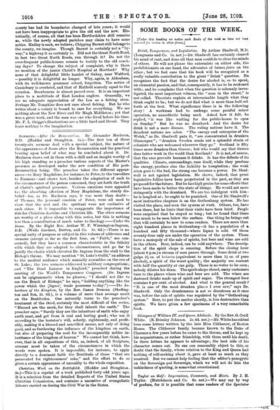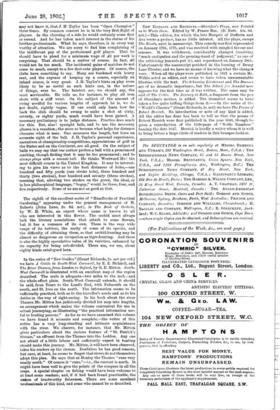may not know it, that J. U. Taylor has been
" Open Champion" three times. By common consent he is in the very first,flight of players. In the choosing of a side he would certainly come first or second. And he has taken much interest in the status of his brother-professionals. What he says, therefore, is in every way worthy of attention. We are sorry to find him complaining of the indifferent pay of the professional golf player. That he should have to plead for a minimum wage of .21 per week is surprising. That should be a matter of course. In fact, 1.2 would not be too much. The incidental gains of matches do not come to much, except to a few first-rate players. Of course, the clubs have something to say Many are burdened with heavy rent, and the expense of keeping up a course, especially an inland course, is very great. J. H. Taylor's hints on play seem likely to be as useful as such hints can, in the nature of things, ever be. The briefest are, we should say, the most serviceable. He tells us, for instance, to play all iron shots with a stiff wrist. On the subject of the amount of swing needful for various lengths of approach he is, we do not doubt, rightly vague. If one could only learn how far back the club should be swung to make a shot at sixty, seventy, or eighty yards, much would have been gained. A necessary preliminary is to judge distance. Practice does much for this. But, alas ! eyesight fails, and to use the necessary glasses is a vexation ; the more so because what helps for distance obscures what is near. One measures the length, but loses an accurate sight of- the ball. • J. H. Taylor's personal experiences, narratives of championship competitions, appreciations of golf in the States and on the Continent, are all good. On the subject of bells:we may say that our author prefers a ball with a pronounced marking, though finding that it may be too pronounced ; and he always plays with a remade ball. He thinks Westward Ho ! the most difficult course in the United Kingdom. It may be interest- ing- to give his views as to the best distances of holes,—one hundred and fifty yards (one stroke hole), three hundred and thirty (two strokes), four hundred, and seventy (three strokes), meaning that, allowing two strokes on the green, the ideal, or in Tess philosophical language, " bogey," would be three, four, and five respectively. Some of us are not as good as that.



















































 Previous page
Previous page